Being one of the most popular beverages, many people drink tea not once but several times a day. But what if you are fasting? Do you think it is alright to drink tea when fasting? This article discusses everything you should know about tea consumption while intermittent fasting.
Intermittent fasting involves cycling between voluntary fasting and non-fasting over a given period. There are several fasting methods, including time-restricted plans such as the 16:8 or 14:10, among other fasting practices like 24-hours fasting, alternate-day fasting, etc.
However, you should keep yourself hydrated while fasting. Let us discuss if you can include sugar-free tea in your fasting regimen.
Calculate Your Autophagy Timeline
Find out exactly when your body enters autophagy based on your unique profile, diet, and fasting protocol.
Calculate My Autophagy Window →What’s in a Cup of Tea?
Are you wondering if a cup of tea will break your fast? You are not alone.
Fasting is impacted by anything which triggers an insulin response. Unsweetened tea may not cause an insulin spike or yield calories, so you can consider drinking it during your fast.
However, it is essential to note that adding sugar, milk, or honey to your tea will not only break your fast but will also add calories, thereby diminishing the overall purpose of intermittent fasting. A cup of tea with full-fat milk contains nearly 200 calories, while that with non-fat milk may have 160 calories.
Interestingly, some studies suggest that tea consumption is inversely associated with obesity. [1]
However, adding it to your fasting regimen may need some regulation, especially if you don’t wish to pile calories and banish the very purpose of fasting.
Will Tea Break Your Fast?
Studies indicate that you can consume unsweetened tea or coffee during a fast without breaking it. [2]
Notably, there are no restrictions on non-caloric beverages while fasting. You can consume as many calorie-free beverages, including tea, during intermittent fasting. Some studies reveal that drinking tea, especially green tea, during fasting periods can help you deal with hunger pangs. [3]
You’ll experience fullness when you drink fluids, even when they are not sugar or calorie-loaded. So, drinking tea might deceive your body by keeping you satiated during a fast.
Best Teas While Fasting
From plain loose tea leaves to exotic herbal tea bags, teas come in various forms allowing you to choose from the extensive options available. If you are selecting teas for your fasting phase, you should pick the ones that benefit you.
Here are the best teas to consume while on a fast:
Ginger Tea
It is known to soothe an upset or irritable stomach. Moreover, the strong tea flavor can help calm your mood and emotions. It can also help improve your fasting blood sugar levels. [4]
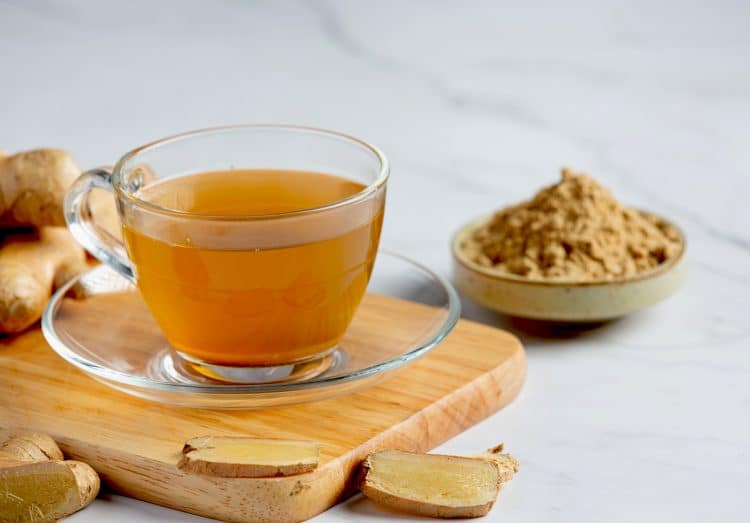
Hibiscus Tea
With its well-regarded calming effect, this tea can be used by hypertensive people as it can effectively reduce blood pressure. [5]
Green Tea
It has long been used to aid weight loss. It is also known to boost energy, regulate healthy glucose and metabolism, and help you get through tough fasting periods as it can keep you feeling satiated [6]. Green tea can curb appetite, deliver a solid dose of antioxidants, prevent diseases, reduce cholesterol levels and rejuvenate your skin.
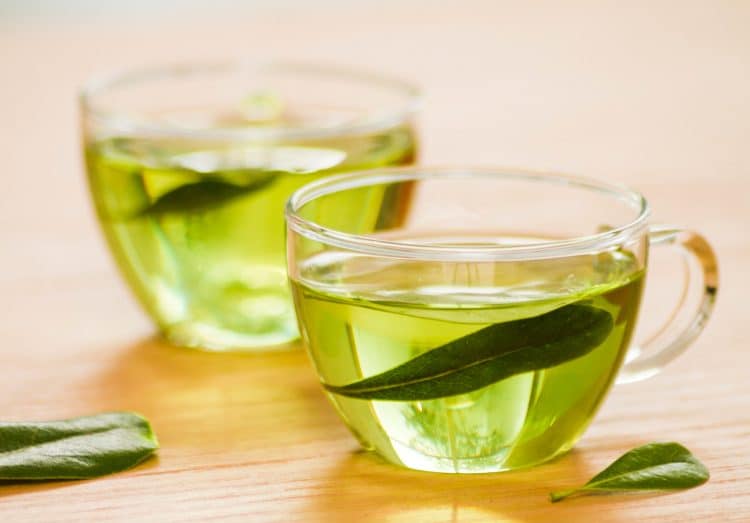
Although green tea or black tea are popular fasting choices, you can also try herbal tea. While staying guilt-free, several herbal teas can be added to your fasting tea list.
Black tea can help in weight loss and quick regaining. It prevents atherosclerosis, can slow down cholesterol liver synthesis, might reduce inflammation, and has antioxidant effects.
You can check out various herbal teas in the market, such as oolong tea, chamomile tea, peppermint tea, rooibos tea, etc. Herbal teas provide anti-stress effects, improve digestion, enhance heart health, strengthen immunity, and prevent colds. Their calming properties can help you deal with fasting-related fatigue and insomnia. And lastly, if you already haven’t, you can also try dandelion or nettle tea.
Related: Best green teas and green tea extracts.
Black Tea and Green Tea: The Difference
What you see in the market as black or green tea is derived from the same tea plant. The only difference is in the way they are processed. While black tea leaves are fermented, their green counterparts are not.
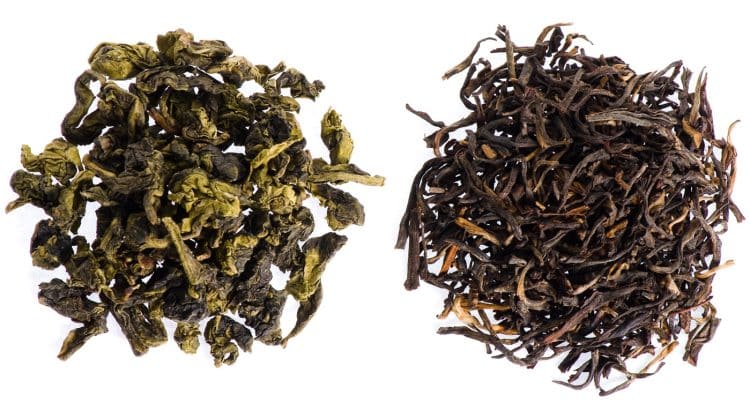
The probiotic properties of fermentation make black tea an excellent option for promoting balanced gut health. On the other hand, fermentation decreases the level of antioxidants present in black tea while elevating its caffeine level slightly compared to green tea.
Recent studies indicate that the temperature of tea served is equally essential to derive optimal benefits from it. [7]
While traditionally, brewing tea in hot water was the standard process, recent studies indicate that this can cause oxidation, destroying a substantial amount of the catechins and polyphenols responsible for providing you with the health benefits you seek.
The contemporary school of thought proposes that adding cold water to your tea allows the polyphenols and catechins to maximally extract their properties without destroying them. The crystallization process makes it easier for the tea to dissolve at any water temperature.
Fasting With Matcha Tea
Over the last few years, matcha green tea has been gaining the spotlight with its antioxidant properties that can enhance the body’s cholecystokinin (CCK) levels.
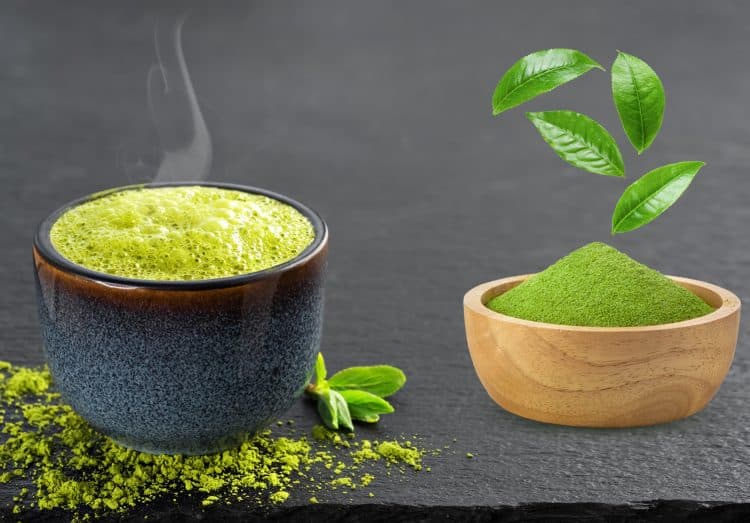
CCK hormones can suppress hunger and activate the digestion of fats and proteins you consume. Consuming matcha green tea during intermittent fasting can promote healthy weight loss and help control your appetite. It has been known to boost your immunity and energy levels.
While matcha tea encourages fasting metabolism, it also increases the body’s ability to recycle resources and heal them, akin to autophagy. So, if you are practicing intermittent fasting and drink matcha tea free of additives, you may benefit from ketogenesis and insulin sensitivity. Matcha is almost calorie-free and rich in most fasting-friendly compounds. Fasting with matcha tea can enhance the body’s natural ability to detox and eliminate toxins while safeguarding it from oxidative stress.
Benefits of Intermittent Fasting With Tea
While intermittent fasting involves cycling between fasting and eating windows, you can always soothe yourself with tea while practicing any such diet plan. Just make sure to not add calories to the beverage through sugar, milk, or artificial sweeteners. Here are some ways in which your body can benefit from drinking tear while fasting:
1. Calm Hunger Without Interfering With Your Fasting Schedule
Adjusting to a new fasting regimen may take a few days. But hunger is real and you might sometimes feel quite hungry during the initial stages. During such times you can appease your hunger with green tea as it can calm and ease the discomfort.
Unlike a cup of coffee that can leave you feeling jittery, green tea, hibiscus or ginger can calm and help you focus through the fasting period. Also, research indicates that a specific compound and antioxidant known as catechins found in tea may aid in reducing the production of ghrelin. Ghrelin is a hunger hormone produced in the stomach that signals your brain that your stomach is empty and ready to eat. [8]
2. Enhanced Weight Loss
Tea can trigger weight loss, but it should be calorie and sweetener-free.
3. Tea Can Act As Your Health Support System
Your tea contains polyphenols which act as super antioxidants for your gut health. Research reveals that tea could favorably regulate your gut microbiome profile [9]. While most tea leaves offer such benefits, ginger, hibiscus, or green tea offer the best results.
4. Tea Can Increase Relaxation
While there are proven advantages of intermittent fasting, initial starvation can cause temporary stress. Studies indicate green and black tea contains an amino acid that can lower your stress levels. [10]
5. Aids Detox
Drinking tea during intermittent fasting can help your body’s natural detoxification process. This process is called autophagy, where protein activation helps the body flush out damaged cells and encourage the generation of new ones.
Autophagy can preserve muscle mass and prevent aging and many age-related diseases. When your body is fasting, the catechins in tea trigger autophagy, allowing the body to detox and rebuild cells. If you aim to eliminate free radicals and reduce oxidative stress, drinking tea can help you lose weight and detoxify.
The body’s natural detoxification patterns heighten during a fasting period. Adding your favorite herbal tea to the mix can benefit your body by aiding the process.
Things To Avoid When Introducing Tea To Your Fasting Plan
Here is how to make the most of tea in your intermittent fasting plan:
No Sugar or Sweeteners
If you wish to include tea in your IF regimen, it certainly has to be unsweetened. Adding milk or creamer should be ruled out as such ingredients contain calories.
Moderation is Key
While black, green, or herbal tea does not contain calories, it does not mean you can have countless cups a day. Remember, be it tea or coffee, they contain caffeine, just that the levels may vary. Caffeine overconsumption can cause side effects such as irritability, anxiety, lethargy, and headache, which can disrupt your fasting goals. Also, too much green tea can interfere with your body’s iron absorption levels. Hence, you should not consume more than three to four cups of tea a day.
Frequently Asked Questions
How can drinking tea help me when fasting?
You don’t necessarily need to consume tea when fasting. Tea lovers can drink unsweetened tea during their fasting period if they wish to. It can help regulate blood sugar levels, reduce inflammation, aid digestion, and deliver antioxidants.
Can I lose weight by drinking tea while fasting?
Unsweetened teas may not cause an insulin spike and can help you achieve your fitness goals as planned through your intermittent fasting schedule. Drinking tea offers certain health benefits, such as boosting your immune system and promoting overall well-being, which can contribute to your fasting results.
Can I only drink green tea while fasting?
No, you can also include various herbal teas and black tea in your fasting plan. Every tea type has its benefits. Make sure to keep your tea unsweetened and calorie-free. Plus, stay well-hydrated while fasting.
Learn more about fasting
- Fasting Electrolyte Calculator - Sodium, Potassium, Magnesium
- PSMF Calculator - Protein Sparing Modified Fast
- Fasting Schedule Generator - Build Your Plan
- Ketosis Calculator - When Do You Enter Ketosis?
- Metabolic Switching Calculator - Fat Burning Timeline
- 5:2 Diet Calculator - Fast Day Calories
- IF Macro Calculator - Intermittent Fasting Macros
- Live Fasting Timer - Track Your Fast in Real Time
- Fasting Progress Tracker - Track Your Journey
- Fasting Protocol Comparison - Find Your Best Method
- Extended Fasting Calculator (24-72+ Hours)
- OMAD Calculator - One Meal a Day Calories & Macros
- Fasting Age Calculator - Biological Age Impact
- What Breaks a Fast? - Complete Food & Drink Guide
- Autophagy Calculator - When Does Autophagy Start?
Concluding Thoughts
Tea leaves brewed in water are calorie-free and rich in antioxidants. They can also keep you calm and relaxed through the fasting periods while keeping your cravings at bay.
You should also drink plenty of other calorie-free fluids while fasting to maintain electrolyte balance and stay hydrated and energized throughout the day. We hope this article has cleared all your doubts about drinking tea while intermittent fasting. If you still have questions, let us know in the comments below.
References
Fitness Volt is committed to providing our readers with science-based information. We use only credible and peer-reviewed sources to support the information we share in our articles.
- Vernarelli, Jacqueline A., and Joshua D. Lambert. “Tea Consumption Is Inversely Associated with Weight Status and Other Markers for Metabolic Syndrome in U.S. Adults.” PubMed Central (PMC), 10 July 2012
- Templeman, Iain, et al. “Intermittent Fasting, Energy Balance and Associated Health Outcomes in Adults: Study Protocol for a Randomised Controlled Trial – PMC. .” PubMed Central (PMC), 2 Feb. 2018
- The study, by Johann, et al. “Appetite-Suppressing and Satiety-Increasing Bioactive Phytochemicals: A Systematic Review – PMC.” PubMed Central (PMC), 17 Sept. 2019
- Khandouzi, Nafiseh, et al. “The Effects of Ginger on Fasting Blood Sugar, Hemoglobin A1c, Apolipoprotein B, Apolipoprotein A-I and Malondialdehyde in Type 2 Diabetic Patients – PMC.” PubMed Central (PMC)
- Jalalyazdi, Majid, et al. “Effect of Hibiscus Sabdariffa on Blood Pressure in Patients with Stage 1 Hypertension – PMC.” PubMed Central (PMC)
- Chacko, Sabu M., et al. “Beneficial Effects of Green Tea: A Literature Review – PMC.” PubMed Central (PMC), 6 Apr. 2010
- Islami, F., et al. “A Prospective Study of Tea Drinking Temperature and Risk of Esophageal Squamous Cell Carcinoma – PMC.” PubMed Central (PMC), 20 Mar. 2019
- “Effect of Green Tea on Plasma Leptin and Ghrelin Levels: A Systematic Review and Meta-Analysis of Randomized Controlled Clinical Trials – PubMed.” PubMed, 1 Jan. 2018
- “Tea Compounds and the Gut Microbiome: Findings from Trials and Mechanistic Studies – PubMed.” PubMed, 3 Oct. 2019
- “L-Theanine, a Natural Constituent in Tea, and Its Effect on Mental State – PubMed.” PubMed, 1 Jan. 2008
Tip: If you're signed in to Google, tap Follow.



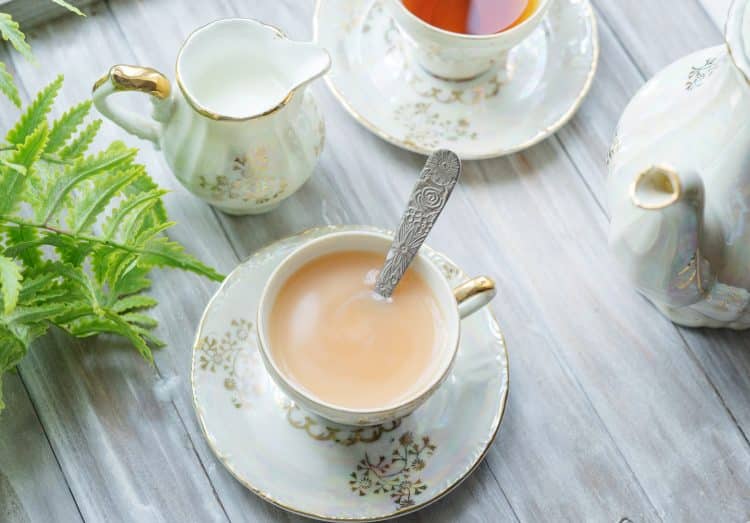








I used to drink sweetened tea during my fasting window bc I just thought every kind of tea doesn’t break my fast lol…But after I used the Litely app that provided me with customized expert guidance, I changed my drinking habits in my fasting window bc it instructed me to drink unsweetened tea.